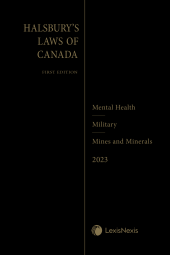Canadian Anthology on Mental Health and the Law
One Year Subscription Only Terms
Subscribers receive the product(s) listed on the Order Form and any Updates made available during the annual subscription period. Shipping and handling fees are not included in the annual price.
Subscribers are advised of the number of Updates that were made to the particular publication the prior year. The number of Updates may vary due to developments in the law and other publishing issues, but subscribers may use this as a rough estimate of future shipments. Subscribers may call Customer Support at 800-833-9844 for additional information.
Subscribers may cancel this subscription by: calling Customer Support at 800-833-9844; emailing customer.support@lexisnexis.com; or returning the invoice marked 'CANCEL'.
If subscribers cancel within 30 days after the product is ordered or received and return the product at their expense, then they will receive a full credit of the price for the annual subscription.
If subscribers cancel between 31 and 60 days after the invoice date and return the product at their expense, then they will receive a 5/6th credit of the price for the annual subscription. No credit will be given for cancellations more than 60 days after the invoice date. To receive any credit, subscriber must return all product(s) shipped during the year at their expense within the applicable cancellation period listed above.
Détails des produits
General Editors and Authors: Anita Szigeti, Ruby Dhand, Dena Bonnet and Justice Jill R. Presser
Click here for the student edition of Canadian Anthology on Mental Health and the Law.
Thoughtfully edited by four of the nation’s leading subject matter experts, Canadian Anthology on Mental Health and the Law brings together the voices of multidisciplinary experts from coast to coast. It explores complex dynamics at the intersection of mental health and the law and explains more sophisticated concepts in detail. It is a reference to consult when confronted with difficult problems in mental health and the law.
This special collection contains contributions by 70 extraordinary authors – judges, academics, lawyers, psychiatrists and other mental health professionals – in conversation with family members, victims, and people living with mental health challenges. It contains 50 unique chapters and is organized into seven main themes:
- Civil mental health law
- Specialized / Therapeutic courts
- Criminal law
- Review Board law
- Administration of justice issues
- Coroner’s inquests
- Other hot button issues
Topics Covered
- MAID and mental illness
- Overuse of psychiatric segregation
- Police interactions with persons in crisis
- Race-based discrimination in our mental health and justice systems
- How administrative tribunals adjudicate mental health matters
- Mental health and legal education
- Answers everyday questions, including:
- Can we really predict risk of violence?
- Is an NCR Verdict a life sentence?
- How do mental health and drug treatment courts work across Canada?
- Can victims and families navigate our justice system?
- What do people who live with mental health issues or use drugs actually need?
- Plus many more
Who Should Read This Book
- Crown Counsel who appear in criminal court and encounter fitness or criminal responsibility issues
- Defence Counsel who represent accused persons with serious mental health issues before the Courts or at the Review Board
- Lawyers who represent patient applicants in civil mental health tribunal proceedings
- Wills and estates lawyers who advise on power of attorney or consent and capacity issues
- Health lawyers who represent parties before the courts, in consent and capacity matters, or the officers in charge of Psychiatric Facilities that detain or supervise the accused
- Judges who are tasked with ordering assessments, hear fitness or NCR matters, or determine capacity issues in guardianship applications
- Hospitals and psychiatric facilities whose officers in charge need to know their duties and obligations under the Mental Health Act and Part XX.1 of the Criminal Code
- Consent and Capacity Board members who are called upon to determine issues of involuntary committal and capacity
- Criminal Code Review Board members who preside over at least annual disposition reviews of unfit and NCR accused persons
- Doctors, psychiatrists, physicians, forensic consultants, and other mental health professionals who assess patients for treatment capacity or may be called as witnesses at Review Board hearings
- Community mental health agencies who provide care and supervision to persons subject to Review Board jurisdiction or civil mental health outpatient treatment orders
- Law professors and law students enrolled in studies with course material in Canadian mental health law
- Individuals Living with Serious Mental Health Issues, their families and others who want to know more about their rights or how to navigate the justice system as it pertains to them
Table des matières
Chapter 1: Mental Health and Legal Education – Benjamin L. Berger and Lorne Sossin
CIVIL MENTAL HEALTH LAW IN CANADA
Chapter 2: British Columbia’s Mental Health Act: Deemed “Consent” Is Not Consent – Anita Szigeti and Ruby Dhand
Chapter 3: Transformation of Alberta’s Mental Health Act – Mary Marshall and Sarah Rankin
Chapter 4: Ontario’s Mental Health Act: Administrative Review of Long-Term Psychiatric Detention – Kelley Bryan and Caitlin McNair
Chapter 5: Supporting Hospitals and Health Care Practitioners Before Provincial Civil Mental Health Tribunals – Katharine Byrick and Daphne Jarvis
Chapter 6: Mental Healthcare Decision-Making Rights in Canada – Sophie Nunnelley
Chapter 7: Indigenous People and Psychiatric “Non-Compliance” as Resistance – Naomi Sayers
Chapter 8: Examining the Impact of Part 3 of British Columbia’s Adult Guardianship Act – Ruby Dhand and Anita Szigeti
Chapter 9: Elder Law: Unlawful Detention of Older Adults in Various Facilities – Jane E. Meadus
SPECIALIZED / THERAPEUTIC COURTS
Chapter 10: The Edmonton Mental Health Court – The Honourable Renée Cochard
Chapter 11: Peterborough Community Support Court: The Middle Road – Kelly Eberhard
Chapter 12: The Therapeutic Court Approach vs. An Individualized Approach in the East Region Through the Eyes of Defence Counsel – Michelle O’Doherty and Neha Chugh
Chapter 13: Mental Health Courts: Integrating Risk-Need-Responsivity Principles to Improve Outcomes – Mary Ann Campbell and Brianna Boyle
Chapter 14: Exploring the Role of Trauma in Drug Treatment Courts – Nikoleta Curcin
Chapter 15: Substance Use Disorder, the History of Drug Criminalization in Canada, and Hopes for Future Drug Policies – Cassandra DeMelo
CRIMINAL LAW
Chapter 16: The Taylor Test for Fitness Revisited in R. v. Bharwani – Maya Shukairy and Anita Szigeti
Chapter 17: Forensic Psychiatric Perspective and Approach to Fulsome NCR Evaluations, Opinions and the Court – Dr. Mark Pearce and Dr. Robert McMaster
Chapter 18: Actuarial Risk Assessments in Forensic Psychiatry: Tools, History, Use, Advantages and Criticisms – Gary Chaimowitz, Mini Mamak and Heather Moulden
Chapter 19: The Role of Psychology in the Forensic Mental Health System: Scope of Practice and Common Assessment Questions – Stephanie R. Penney
Chapter 20: Section 16 of the Canadian Criminal Code and the Meaning of “Incapable” of “Knowing” One’s Act or Omission Is “Wrong” – Eric Siebenmorgen and Dena Bonnet
Chapter 21: Ineffective Legal Advice Re NCR: Forensic Client Eye View on Effective and Ineffective LEGAL Counsel – Jennifer Chambers
Chapter 22: “Gladue” – Indigenous People and Mental Health Issues in the Criminal Law – Omeasoo Wahpasiw and Ruby Dhand
Chapter 23: The Role of Amicus Curiae in Criminal Trials With Self-Represented Accused Where Mental Health Is An Issue: R. v. Kahsai – Carter Martell
Chapter 24: Fitness Post-Determination of Guilt But Pre-Sentence: A Tricky Situation – Annika Butler
Chapter 25 : Mental Health as a Factor in Sentencing – Amy Shoemaker
Chapter 26: Miscarriages of Justice and Mental Health – Justice Harry LaForme, Professor Kent Roach, Caleigh Glawson and Anita Szigeti
REVIEW BOARD LAW
Chapter 27: Indefinite Detention Under Part XX.1 of the Criminal Code and Winko v. British Columbia – Jamie Cameron
Chapter 28: The Involuntary NCR Verdict and the Review Board’s Jurisdiction to Proceed in Abstentia – Jolene Hansell
Chapter 29: Testifying at Provincial Review Boards – Yedishtra Naidoo
Chapter 30: Representing the Person in Charge of the Psychiatric Facility at Criminal Code Review Board Hearings – Lauren Barney and Gavin Mackenzie
Chapter 31: Anti-Black Racism in Forensic Psychiatry and Litigating the Issue Before the Ontario Review Board – A.J. Grant-Nicholson
Chapter 32: Nunavumi Maligalikinikmun Katimajin – The Nunavut Review Board, a Unique Board Facing Unique Challenges – Philippe Plourde
Chapter 33: Experience as a Psychologist and Victim of an NCR Offence – Dr. Lori Triano-Antidormi
Chapter 34: NCR and Unfit Non-Citizens: The Limitations and Risks for Those Who Want to Stay In and for those Who Want to Leave Canada – Liesha Earle
Chapter 35: Mechanisms of “Return” to Hospital Under the Ontario Review Board – Michael Feindel
Chapter 36: Musical Chairs: Patient Transfers Under Rule 13 of the Ontario Review Board – Michael Feindel
ADMINISTRATION OF JUSTICE ISSUES
Chapter 37: Inquiring Into the Inquisitorial Role of Ontario’s Mental Health Tribunals – Dena Bonnet and Anita Szigeti
Chapter 38: One Size Only Fits Some: “Different Modes for Different Folks” — Ensuring Access to Justice for Vulnerable Parties at Hearings of Ontario’s Mental Health Tribunals – Anita Szigeti and Mercedes Perez
Chapter 39: Administration of Justice Issues in Mental Health/Mental Disorder Appeals in the Court of Appeal for Ontario – The Honourable Gladys I. Pardu, Shannon Chace and Anna Trbovich
CORONER’S INQUESTS
Chapter 40: Mental Health Inquests – Institutional and Custodial Deaths – Dr. David Eden and Julian Roy
Chapter 41: Police-Involved Deaths of Black Persons in Crisis – Rick Frank and Yadesha Satheaswaran
Chapter 42: Indigenous People and Mental Health Explored at Ontario Coroner’s Inquests – Etienne Esquega and Kate Forget
Chapter 43: Civilian Mobile Crisis Services – Dr. Jamie Livingston and Jennifer Chambers
OTHER HOT BUTTON ISSUES / MISCELLANEOUS
Chapter 44: Seclusion and Restraint in Psychiatric Facilities: Toward Minimal Restraint in Ontario’s Maximum Security Hospital – Dr. John Bradford, Anita Szigeti and Meera Pahwa
Chapter 45: Mental Health Care in Corrections and Charter Issues – Adelina Iftene
Chapter 46: Habeas Corpus and Psychiatric Detention – Sheila Wildeman
Chapter 47: Medical Assistance in Dying: Implications of Legal Expansion for Persons With Mental Illness – Trudo Lemmens and Sonu Gaind
Chapter 48: Interaction of Mental Health and Criminal Laws for Patients in Police or Correctional Custody in Acute Care – Melanie de Wit and Sahil Gupta
Chapter 49: Legal Issues Family Members of Persons With Serious Mental Health Issues Face – Sherry McKibbon-Thomas and Alison Licht
Chapter 50: Artificial Intelligence at the Intersection of Mental Health Care, Science and the Law – Ruby Dhand and Dipesh Prema
Produits liés
-
 Canadian Anthology on Mental Health and the Law – Student EditionDate de sortie: September 23, 2024140,00 $
Canadian Anthology on Mental Health and the Law – Student EditionDate de sortie: September 23, 2024140,00 $ -
 Halsbury's Laws of Canada – Mental Health (2023 Reissue) / Military (2023 Reissue) / Mines and Minerals (2023 Reissue)Date de sortie: October 18, 2023335,00 $
Halsbury's Laws of Canada – Mental Health (2023 Reissue) / Military (2023 Reissue) / Mines and Minerals (2023 Reissue)Date de sortie: October 18, 2023335,00 $ -
 A Guide to Mental Disorder Law in Canadian Criminal JusticeDate de sortie: August 28, 2020220,00 $
A Guide to Mental Disorder Law in Canadian Criminal JusticeDate de sortie: August 28, 2020220,00 $
 Lexis Nexis
Lexis Nexis